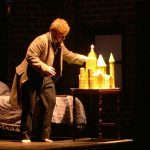Fall Production
The Elephant Man
by Bernard Pomerance
directed by D. Keith Best
October 23-25, 2008
7:30 pm, Fine Arts Theatre
Hyman Fine Arts Center
Francis Marion University
The Elephant Man was first produced in London at the Hampstead Theatre. It soon moved to New York and opened Off-Broadway at the Theatre of St. Peter’s Church, and then to Broadway and the Booth Theatre. Pomerance’s play earned good reviews and a number of awards, including a Tony Award, the New York Drama Critics award, the Drama Desk Award, and the Obie Award.
THE STORY:
The play is based on the true story of a man whose body is hideously deformed, but within is a remarkably sensitive and intelligent being. Merrick is exploited by Victorian society and philanthropy. He is befriended by an ambitious and brilliant young surgeon who looks after him in his last few years finding him a home in a London hospital where the lovable freak’s presence is shrewdly used for fund raising. Merrick is introduced to high society, becoming dependent on the success his deformity brings him. A well known actress tries to ease his sexual loneliness, but her efforts are thwarted by hypocrisy. Even those who love him can’t help him and ultimately he dies from his horrible affliction.
The play was so successful that it was turned into an even more successful Hollywood film in 1980. — Samuel French Play Service
“Utterly fascinating… A distinguished piece of work.” N.Y. Daily News.
“A thoughtful, moving and worthwhile play.” N.Y. Times.
“At heart in addresses the simple issue of what it means to be human” N.Y. Daily News.
Spring Production
An Evening of Beckett
directed by L. Dawn Larsen
April 16-18, 2009
7:30 pm, Fine Arts Theatre
Hyman Fine Arts Center
Francis Marion University
An Evening of Beckett features two of Samuel Beckett’s one act plays, Endgame and Krapp’s Last Tape.
Samuel Beckett’s work is considered the visual representation of the absurdist philosophy: A philosophy, often translated into art forms, holding that humans exist in a meaningless, irrational universe and that any search for order by them will bring them into direct conflict with this universe.
Endgame:
“Endgame has outraged the Philistines, earned the contempt of the half wits and filled those who are capable of telling the difference between a theatre and a bawdy house with a profound and somber and paradoxical joy. . . . A magnificent theatrical experience.” London Sunday Times.
As the play opens, Hamm is dying in a world that seems to be coming to an end. Hamm takes satisfaction in knowing that all of existence may fade to nothing. Hamm is confined to a chair, and throughout the play he discards, reluctantly, the continuing prospects of life: food; painkillers; his servant Clov, on whom he is totally dependent; the pole that enables him to move his wheelchair; and holding the dog, on which he lavishes his affection.
Hamm’s parents, Nagg and Nell, having lost their legs many years ago in a bicycle accident, live in ashbins from which they occasionally emerge only to be cursed by their son. His mother dies and Hamm, knowing that Clov is leaving him, prepares for his last battle, first to outlive his father and then to face inevitable death without the help of the few objects that have given him comfort in his final days. Hamm soliloquizes in terms of the last moves in chess, a king evading checkmate as long as possible with stern asides on religion, ‘‘Get out of here and love one another! Lick your neighbor as yourself!’’
Krapp’s Last Tape:
The Off Broadway sensation, a tour de force for one man, is the most affectionate portrait of a character that Beckett has ever done: an aging man who lives a lonely and shabby existence in a darkened room. At year’s end he takes out a bottle of wine, a banana and his tape recorder, and he listens as his own voice from the past recounts the glories and hopes of his youth.
This play is considered to be Beckett’s most autobiographical work.
Krapp’s Last Tape premiered in 1958 as a curtain raiser to a production of Endgame at the Royal Court Theatre in London.






